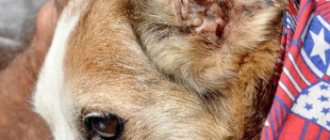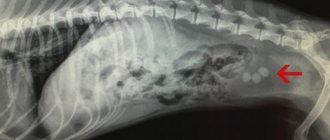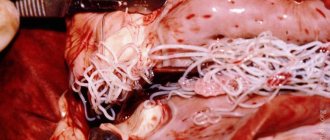How do medicinal ones differ from regular ones?
Veterinary diets differ in composition from conventional feeds. This may be either an increased amount of special additives or microelements, or the absence of ingredients potentially harmful to the dog’s health.
A distinctive feature of medicinal feeds is that they are consumed for a limited time. Until the pet is completely healthy. You can find out more about the terms of use directly on the product packaging.
Reasons for development
Enterocolitis is usually divided into primary and secondary. The causes of the primary form of the disease are:
- Poisoning, including the entry of poisonous plants into the dog’s digestive tract (milkweed, colchicum, crocus, azalea);
- Mechanical damage to the intestines (sharp bones or foreign objects caught in it);
- The presence of harmful foods in the dog’s diet (stale, fried, containing hot spices).
The above reasons cause an inflammatory process in the intestines and the death of natural microflora, while pathogenic microorganisms receive conditions favorable for reproduction.
The secondary form of enterocolitis is a consequence of viral, bacterial, parasitic or fungal diseases: salmonellosis, giardiasis, helminthiasis, echinococcosis, parvovirus infection. The development of this type of enterocolitis can be caused by physiological pathologies of the intestine (duodenal hypertension, intestinal stenosis, the presence of a tumor), as well as dysfunction of the immune system.
When is medicated food prescribed?
Therapeutic diets are prescribed in the following cases:
- with gastritis;
- for food allergies;
- for gastrointestinal diseases;
- for liver disease;
- for kidney disease;
- for dermatoses (irritations of the skin and fur);
- with urolithiasis;
- cardiovascular diseases;
- oskalata, pancreatitis.
The most common reason for prescribing specialized food is an allergy to certain ingredients. The veterinarian determines what the dog is allergic to and prescribes the appropriate diet.
Veterinary diets are often prescribed for older dogs. This is due to the emergence of numerous health problems during the aging process. First of all, this concerns joint diseases.
Symptoms
The most striking symptoms of the disease in any form are:
- Severe pain and cramping in the area of the pet’s abdomen or stomach (the dog does not allow its belly to be stroked and whines when pressed);
- The abdomen is swollen, tense;
- Constipation or diarrhea (with various types of gastritis, one or another disorder may appear, the first with high acidity, and the second with low acidity; if dark spots are noticed, then the dog has internal bleeding);
- Apathy, loss of interest in life, a significant decrease in activity (the pet will stop playing, running, and prefer to lie down, and not on its stomach);
- Loss of appetite, complete or partial;
- Faded, unhealthy coat, active weight loss;
- Nausea and vomiting (mixed with blood and mucous secretions);
- White coating on the tongue;
- There may be thirst and increased body temperature (37.5-39.5 ° C is considered normal, depending on the size of the dog).
It is worth noting that the symptoms will be bright and sudden in acute gastritis. In chronic cases, the signs are blurred and may hardly bother the animal.
What components should be in veterinary food for dogs?
Medical nutrition is so called because it should help the pet overcome some disease. Accordingly, it must contain some useful components.
Problems with the gastrointestinal tract
Food for dogs with digestive problems should include ingredients that improve stomach function. This is facilitated by herbal supplements that stimulate the liver and stomach. For example: flaxseed, beet pulp, eicosapentaenoic and docosahexaenoic acids, Omega 3. Also, to reduce the load on the gastrointestinal tract, the veterinary diet should contain a minimum amount of fat. Among the additives in the food there should be Choline Chloride, because it helps the damaged liver cells to recover. But abnormal protein content, on the contrary, harms the liver.
For obesity
A good dietary dry food should contain a reduced amount of fat and protein. It is important for overweight pets to consume plenty of fiber. It is easily digestible and provides enough energy for the whole day. Healthy carbohydrates such as potatoes, rice or barley (whole grain, not flour or cereal), flax, beets, carrots and other vegetables and fruits should be present.
For cardiovascular diseases
The diet for animals with heart problems must include the following mineral supplements: K, Mg, taurine and L-carotene. At the same time, the content of sodium and Cl in any form is reduced to a minimum (and even better if these components are absent).
Allergy
The hypoallergenic food market is quite large. To find out which ingredient is causing irritation to your four-legged friend, consult your doctor. Remember that the fewer exotic additives in the food, the lower the chance of a negative reaction in your pet. Choose foods with one source of protein. That is, if the food contains duck, the meat and offal should only be duck. This way you minimize possible damage.
Dry medicated dog food
When choosing medicinal food for your pet, the most important thing is to do no harm. It is important to choose products with a high-quality composition and a sufficient amount of fortified supplements.
Common Causes
In 8 out of 10 cases, the cause of gastritis in a dog is poor quality nutrition. By giving your pet economy-class dry and liquid food, low-quality meat and low-quality vegetables, you risk his health, since they will inevitably lead to problems with the gastrointestinal tract.
Another common cause of gastritis is the wrong choice of food. When creating a diet for your pet, do not forget to take into account its individual characteristics (for example, level of activity during the day and the presence of chronic diseases).
The development of gastritis can be caused by mixing natural and industrial diets, overeating a pet, and even different meal times. Many diseases of the gastrointestinal tract or long-term use of antibiotics can lead to complications, one of which is inflammation of the stomach.
Other causes of gastritis in dogs:
- Violation of the temperature regime of food . The food you give your pet should be at room temperature. You should not give your animal food that you have just taken out of the refrigerator/freezer or that has been overheated.
- Allergy or individual intolerance to any product. Many owners don’t even realize this, so they don’t change their pet’s diet. As a result, inflammation of the mucous membranes of the stomach develops.
- Helminthic infestations. For many helminths, the mucous membranes of the stomach are a favorable environment for feeding and reproduction. They stick to them and begin to produce toxins, which leads to severe irritation and inflammation.
- Ingestion of foreign bodies (objects). Most often it is a bone or a small dog toy. Foreign objects get stuck either in the stomach or in the intestines, therefore disrupting the patency of the gastrointestinal tract and causing severe inflammation.
- Poisoning . It can be food or medicinal. Many owners, wanting to help the dog, give medications from their first aid kit. Even ordinary acetylsalicylic acid (aspirin) can cause gastritis in your pet.
Gastritis can also be caused by other reasons. For example, diseases of the endocrine system (diabetes mellitus, adrenal insufficiency, etc.) often lead to irritation and inflammation of the mucous membranes of the stomach. The cause of gastritis in your pet may be iron deficiency or hypovitaminosis C, B1, B2, B6 and B12.
There are many reasons that can trigger the development of gastritis in dogs. That is why we strongly do not recommend trying to make diagnoses on your own. If you suspect that your dog has gastritis, contact a veterinary clinic in Moscow and get examined by a specialist!
What brands produce veterinary food?
Note that not all dry food manufacturers burden themselves with producing a veterinary line. Which manufacturers produce specialized feeds:
- Brit;
- Hills;
- Farmina;
- Monje Grainfree Veterinary;
- Royal Canin Veterinary Diet;
- Purina Veterinary Diets.
To find out whether a certain company produces medicinal food, just familiarize yourself with their assortment. For example, you can find hypoallergenic food from such popular manufacturers as Acana or First Choice.
We have prepared a small rating-review of medicinal foods.
Brit VD Struvite Dog for kidney stones
Brit is a completely grain-free complete food for dogs. The composition of the granules is designed to help animals suffering from struvite stones. Other ingredients include: cranberry, methionine, probiotics for gut health.
Farmina Vet Life Gastrointestinal for gastrointestinal diseases
Veterinarians prescribe farmina to pets who have recently undergone gastrointestinal surgery. The composition contains an increased amount of probiotics. It is also recommended for pancreatitis and other diseases of the pancreas.
Hills Prescription Diet for allergies
Dry therapeutic food Hills for dogs with allergies. The composition is selected in such a way as to exclude most possible allergens. Although there is also little good in Hills food. Corn is present, the composition is generally unclear. But since there are often no analogues to Hills (and this particular manufacturer specializes in therapeutic diets), there is nothing to choose from.
MONGE VETSOLUTION DOG DERMATOSIS
Indicated for various dermatoses, other skin diseases and some gastrointestinal problems. Rare and nutritious salmon serves as a source of protein. Includes useful additives such as: aloe extract, L-carnitine, freeze-dried melon pulp.
Purina Veterinary Diets Kidney Function for Kidney Failure
In addition to combating kidney failure, the food is also designed to combat the early stages of heart failure.
Differs in reduced protein content. Instead of meat, the composition includes more gentle egg whites and milk powder. Among the disadvantages of the food, one can note the presence of corn in the composition.
OptiMeal Hypoallergenic
OptiMil food from this line is suitable for dogs with sensitive skin and digestion. Contains dehydrated salmon, healthy carbohydrates (barley and rice) and mineral supplements. Rare ingredients included: burdock root, marshmallow root, marigold. Decent food that can be given to your pet without fear.
Wet medicated dog food
If your dog prefers canned food, it is not a problem for him to choose ready-made food. Some manufacturers create therapeutic wet nutrition. For example:
Purina Veterinary Diets EN - Gastroenteric Canine
Suitable for animals suffering from gastrointestinal diseases. The composition includes offal, rice, liver, chicken meat, etc.
Includes L-Lysine and other additives. But be careful because it also contains dye. Possibly artificial.
Royal Canin Gastro Intestinal Low Fat Canine Cans
Among the indications for the use of these canned foods are diseases such as hyperlipidemia, pancreatic insufficiency, etc. The composition is rather vague. The contents of the jar include meat, grains, minerals and vitamin D3.
What food additives and ingredients in food can harm the animal?
Select food for a sick pet more carefully. If there are already any health problems, the animal cannot eat low-quality food.
- Propyl gallate. This preservative is considered a harmful additive for all animals without exception. It is strictly contraindicated for dogs with stomach, kidney and liver problems, as well as for pets prone to allergies.
- Corn. A poor source of carbohydrates, difficult for the stomach to digest.
- Artificial additives Ethoxyquin, BHA, BHT, Propylgallate. Various international authorities are suspicious of this type of substance. There are studies that prove a direct connection between premature aging of dogs and the consumption of these components.
- Artificial dyes. High risk of irritation.
- Sugar. Animals are not allowed to give sweets at all, in any form and under any pretext.
Prevention
Measures to prevent the development of enterocolitis in a dog include:
- Timely vaccination and treatment against parasites;
- Using fresh and high-quality feed, and for old and weakened animals, following a light diet;
- Walking the dog on a leash, eliminating the possibility of eating garbage;
- Limit the dog's contact with other animals.
Any digestive disorder in a dog should prompt a visit to the veterinarian, since a disease in the initial phase of development can often be cured within a few days, while a disease that has become chronic often requires many years of treatment and may have a poor prognosis.
Veterinarian recommendations
Yulia Vladimirova
“A few words about the food. At first glance, it is balanced in terms of nutritional supplements, but the amount of nutrients is minimal. There is not enough fat, this affects the appearance of the coat. There is very little fiber; this food is not suitable for animals with stomach problems.”
Ekaterina Nigova
“Dogs tend to recognize food by smell. If they don't like the smell of even the most elite food, they are unlikely to eat it. Manufacturers often add flavorings to food. Natural ones do not cause any harm, but artificial ones are real evil. Especially in medicinal feeds, they 100% shouldn’t be there.”
Stanislav
“If your pet is allergic, remember: the fewer ingredients in the food, the better. Any exotic additives can also cause irritation.”
Symptoms of enterocolitis in dogs
Since enterocolitis is a severe pathology that affects the entire system of the body, the clinical signs develop bright, clearly visible to the naked eye:
- One of the very first signs is diarrhea. In this case, abundant mucus impurities are clearly visible in the stool. If it goes unnoticed and the disease progresses, the mucus is replaced by blood impurities.
- Since the disease is quite severe (especially in its acute form), the dog becomes lethargic, apathetic, stops playing, is reluctant to go for a walk, and completely or partially loses its appetite.
- The more the disease progresses, the more time the dog spends in the “eagle pose.” He is tormented by an empty urge to defecate, which is why the pet can sit under a tree for the entire walk, trying in vain to squeeze at least something out of himself. But even if successful, what comes out of the dog’s intestines is not feces, but the same mucus and blood.
- If a dog suffers from constant liquid diarrhea with water, blood and mucus, there is a high chance of death due to dehydration. The coat of a sick dog becomes dry, the skin loses its elasticity, and in the most severe cases, the eyeballs become sunken. With this course of the disease there is a risk of rectal prolapse.
- Since enterocolitis is almost always accompanied by powerful autointoxication of the body (destroyed mucous membranes will not stop toxins), sick dogs often vomit.
- All visible mucous membranes turn pale, anemia develops (due to constant blood loss through the intestines).
- Even if the pet retains at least some appetite, this does not save it from exhaustion. With chronic enterocolitis (if the animal turns out to be sufficiently tenacious), it can lead to cachexia, i.e. extreme degree of exhaustion.
- Massive hair loss is possible.
- Many forms of enterocolitis are characterized by severe flatulence. The dog is noticeably “bloated”, the abdominal wall is tense and painful.
- Infectious forms of inflammation are characterized by constant or intermittent fever, and the dog may shiver severely.
If any signs of enterocolitis appear, the animal must be shown to a veterinarian in any case. We would strongly advise against prescribing treatment on your own, since you first need to establish exactly what exactly caused the development of the disease. As you can easily understand, the treatment of nutritional (for example) and toxic enterocolitis differs significantly!
Owner reviews
Igor
“The dog had a problem with the gastrointestinal tract. I ate Royal Canin Gastro Intestinal canned food for a month, and my health stabilized. We were satisfied."
Julia
“I have 8 small breed dogs. We've been eating Hill's for minis for a long time. The dogs look great, all show dogs. Consumption is minimal, because the daily feeding rate is low. The price corresponds to the quality. She has raised several generations on the Hills. Special thanks for the healing food! For any problems – only Hills!”
Andrey
“We found Advance Hypoallergenic for our picky dog. She eats with pleasure, although she previously refused the same Brit and Royal Canin.”











